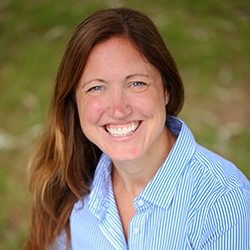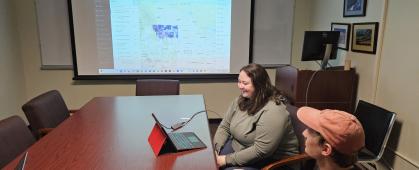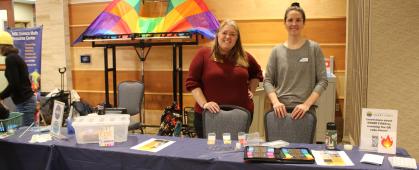
What is your name, what do you do, and where?
Libby Metcalf is a professor at the University of Montana in Missoula. She is in the Franke College of Forestry and Conservation, in the Department of Society and Conservation. Her official title is the Joel Meier Distinguished Professor of Wildland Management, and she is also an Associate Dean of the college! A lot of her work is focused on humans and how they interact with the natural environment, and most of her research is largely in that area.
Where did you grow up?
Libby grew up in Connecticut, in the foothills of the Berkshires.
What do you do for your research and studies?
One thing that Libby spends a lot of time thinking about is how humans interact with wildlife. The research she is most known for in Montana is her work with wildlife. She and her research partner (who happens to be her husband) look at the thorniest, stickiest wildlife issues in the state. They look at wolves and grizzly bears and try to understand how the Montana public accepts those animals in their lives, specifically how they are moving towards coexistence. Libby spends a lot of time working with state agencies, thinking about hunting and hunters. She also teaches a class at the University of Montana called Wild Sustenance, which is an immersive course about hunting. This class dovetails with her research on hunters and how they are a part of the system of managing wildlife in the State of Montana.
Libby also thinks a lot about communities and community resilience, and how communities respond to changes in where they live. Recently, she worked on a project with CREWS where they were thinking about how communities are transformed after legacy mining, specifically focusing on Anaconda and Deer Lodge, MT. These communities are nestled along the Clark Fork River and have seen all kinds of damage from contamination of the water and soil. These communities are reimagining who they are and trying to remember their legacy of mining while also transforming themselves into a new economy and a new place to be.
Libby’s involvement in the SMART FIRES project is focused on the prescribed fire component of wildfire. She is interested in the leaders and decision-makers who think about prescribed fire. Her team wants to know how communities and decision-makers decide when to have prescribed fire on the landscape. One thing she finds neat about this project is that there are a bunch of different levels where decisions are being made and she wants to understand that process. Libby’s team is also thinking about the best ways to work with partners across the state to ensure that the work they’re doing and the data they’re collecting are getting into the hands of end users so decision-makers can use it.
What did you like to do as a young person?
Libby was always outdoors! Her family did not enjoy the outdoors as much as her, but she was pushed into outdoor programming by her mother and father. As a kid, she was sent on day hikes or signed up for rock climbing classes. When she was a child, her parents put her and her siblings in BMX racing. When she was about 12, she made it to nationals in BMX racing and did quite well! Libby was always a kid tramping through the woods, which led to her choosing outdoor recreation as a potential career path in college. She worked a lot with wilderness therapy and outdoor education programs where she worked on multiday backpacking trips. Libby started running in high school and went on to run in college.
At what age and how did you know you wanted to be a scientist?
Libby never had a clue she was going to be a scientist! She felt she was different, and traditional learning styles didn’t resonate with her. She struggled a bit in grade school, but when she got to college and realized there were so many ways to learn, it was very eye-opening. That's when she developed her passion for learning.
Out of her bachelor’s degree, Libby was working for a wilderness school, and she was very frustrated by the leadership there. She knew she wouldn’t be hired as a director without a master's degree, so she went to get her master's at West Virginia University in a school of natural resources. There she was linked with a professor who has a large research program focused on national forests in the Pacific Northwest. That’s when she began to understand how all the concepts she was learning worked together to form a scientific basis. Her master’s program is where she learned she enjoyed collecting data, writing about data, and asking questions of the world; so, she decided she would go on for a Ph.D. The thought of becoming a scientist at a university sounded like a cool deal to her!
Who were some of the role models, mentors, or other adults who influenced you as a young person?
Libby had a teacher in high school who believed in her. Even when she was struggling with her grades or figuring out what concepts meant, that teacher would sit with her and tell her, “You can do this.” Having someone tell her repeatedly she belonged, and that she could make it to the next level was helpful. Libby also had a string of coaches that were influential in her life. These coaches believed in her, challenged her, pushed her, and wouldn’t let her give up. That was life-changing.
What advice would you give a Montana young person interested in a career like yours?
Be persistent and be tenacious. Those are the two most beneficial skills. Know what your goal is and keep persisting. If something knocks you down, get back up and try again. Persistence is the thing that keeps you moving towards your goal.

